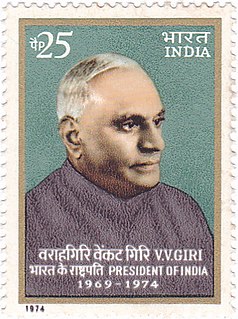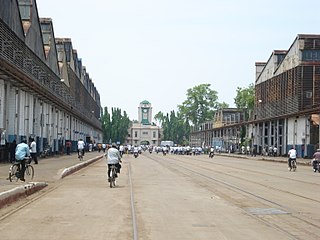A trade union is an association of workers forming a legal unit or legal personhood, usually called a "bargaining unit", which acts as bargaining agent and legal representative for a unit of employees in all matters of law or right arising from or in the administration of a collective agreement. Labour unions typically fund the formal organization, head office, and legal team functions of the labour union through regular fees or union dues. The delegate staff of the labour union representation in the workforce are made up of workplace volunteers who are appointed by members in democratic elections.

Varahagiri Venkata Giri was the fourth president of India from 24 August 1969 to 24 August 1974. He was the only president to be elected as an independent candidate. He was succeeded by Fakhruddin Ali Ahmed as president in 1974. After the end of his full term, Giri was honoured by the Government of India with the Bharat Ratna in 1975. Giri died on 24 June 1980. His great grandson V. Giri Shankar is an Advocate of the Madras High Court, Chennai.

Trade Unions in India are registered and file annual returns under the Trade Union Act (1926). Statistics on Trade Unions are collected annually by the Labour Bureau of the Ministry of Labour, Government of India. As per the latest data, released for 2012, there were 16,154 trade unions which had a combined membership of 9.18 million. The Trade Union movement in India is largely divided along political lines and follows a pre-Independence pattern of overlapping interactions between political parties and unions. The net result of this type of system is debated as it has both advantages and disadvantages. Bharatiya Mazdoor Sangh is the Largest Trade union of India.

The Australian Workers Union (AWU) is one of Australia's largest and oldest trade unions. It traces its origins to unions founded in the pastoral and mining industries in the 1880s and currently has approximately 100,000 members. It has exercised an influence on the Australian trade union movement and on the Australian Labor Party throughout its history.
Timeline of trade union history

Perambur Loco Works is a suburban railway station in the Perambur area of the city of Chennai in India. It serves the Integral Coach Factory (ICF) that is one of the largest railroad carriage and locomotive manufacturers in the world. The station serves growing areas like Periyar Nagar and Jawahar Nagar localities in the north-west corner of Chennai. The station has an elevation of 7.01 m above sea level.

Perambur Carriage Works is a suburban railway station less than a kilometre from the Perambur railway station in Chennai, India. The station has an elevation of 7.16 m above sea level. Mainly POH and IOH of all type of passenger coaches are undertaken here. The railway department has many facilities around this station, including a school and an indoor sporting facility.

The Industrial Disputes Act, 1947 extends to the whole of India and regulates Indian labour law so far as that concerns trade unions as well as Individual workman employed in any Industry within the territory of Indian mainland. Enacted on 11th March 1947 and It came into force 1 April 1947.

Malayapuram Singaravelu, also known as M. Singaravelu and Singaravelar, was a pioneer in more than one field in India. In 1918, he founded the first trade union in India. On 1 May 1923 he organised the first ever celebration of May Day in the country. Singaravelar was a major leader of the Indian independence movement, initially under the leadership of Gandhi, but later, joining the budding communist movement. In 1925, he became one of the founding fathers of the Communist Party of India; and chaired its inaugural convention in Kanpur. Though the British Government arrested him along with other leaders on charges of conspiring to wage war against the Crown, he was set free, soon after, on account of his failing health. Singaravelar was also a path-breaking social reformer who in his early life took to Buddhism, seeing it as a weapon against the evil of untouchability, which was particularly severe in the 19th-century India. He was also in the forefront of Self respect movement, in the Madras Presidency that fought for equal rights for backward castes. Though in his advanced years, he withdrew from active politics, Singaravelar remained a staunch advocate of the causes he had pioneered till his death at the age of 85.

The Golden Rock Railway Workshop, in Ponmalai, Tiruchirappalli, Tamil Nadu, is one of three railway workshops serving Indian Railways' Southern Railway zone. The workshop is part of the railways' Mechanical Department. The other two Southern Railway workshops are in Perambur, Chennai.
Indian labour law refers to laws regulating labour in India. Traditionally, Indian governments at federal and state level have sought to ensure a high degree of protection for workers, but in practice, this differs due to form of government and because labour is a subject in the concurrent list of the Indian Constitution.

Perambur railway station is in Perambur, Chennai, one of the important stations in Chennai, in the Chennai Beach/Chennai Central–Arakkonam section of the Chennai Suburban Railway network. This passenger station serves the city railway colony with its Southern Railway Headquarters Hospital and works, which have their own stations, Perambur Carriage Works railway station and Perambur Loco Works railway station.

The International Federation of Trade Unions was an international organization of trade unions, existing between 1919 and 1945. IFTU had its roots in the pre-war IFTU.
Industrial violence refers to acts of violence which occur within the context of industrial relations. These disputes can involve employers and employees, unions, employer organisations and the state. There is not a singular theory which can explain the conditions under which industrial conflicts become violent. However, there are a variety of partial explanations provided by theoretical frameworks on collective violence, social conflict and labor protest and militancy.
The 1928 South Indian railway strike was a general strike by the South Indian Railway Workers Union against plans of the South Indian Railway Company to lay off over 3,100 workers in order to reduce the expenditures of the company. The strike lasted from 29 June – 2 August 1928, and severely affected the transportation of people and goods across South India. The Madras government and the South Indian Railway Company responded with a crackdown. Most of the leaders of the strike were arrested and recognition to the union was withdrawn.The Government of Madras recorded it as the "most important event of the year".
The 1921 Buckingham and Carnatic Mills strike was a strike by the workers of Buckingham and Carnatic Mills in the city of Madras, India, against the managing company, Binny and Co. The strike, which lasted from June to October 1921, caused severe losses to the Madras economy. It also created a rift in the ruling Justice Party forcing many Dalit leaders to leave.
Railway Labor Executives' Association (RLEA) was a federation of rail transport labor unions in the United States and Canada. It was founded in 1926 with the purpose of acting as a legislative lobbying and policy advisory body. At times, it played a prominent role in setting rail transport policy in the U.S., and was party to six U.S. Supreme Court cases. It disbanded in January 1997, with representation, collective bargaining, and legislative lobbying assumed by the newly formed Rail Division of the AFL-CIO Transportation Trades Department.
The Rhodesian Railway Workers' Union (R.R.W.U.) was a trade union in Rhodesia which represented European railway workers employed by the Rhodesian Railways.

The Chennai Central–Bangalore City line connects the main railway stations in two of the larger cities in India - Chennai in Tamil Nadu and Bengaluru in Karnataka.
Southern Railway Headquarters Hospital, also known as the Perambur railway hospital, is a 500-bed hospital of the Southern Railway located in Ayanavaram, Chennai. It is spread across a land measuring 15 acres (6.1 ha) and was established during the British rule. The hospital has specialized in 15 basic disciplines and super-specialized in 3 disciplines. The National Board of Examination (NBE) has accredited the hospital for recognition in postgraduate training. The hospital has also been accredited by international institutions such as Royal College of Surgeons for imparting training in PG courses. It is also an approved institution for training nurses.










